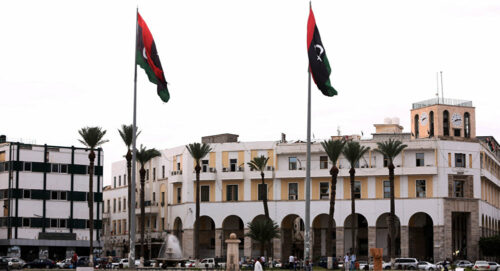
- This event has passed.
Libya: What Does the Berlin Conference Have in Store?

In the coming months, perhaps weeks, Germany plans to hold a UN-backed international conference on the future of Libya. Despite two previous European conferences on Libya in the last year, one in Palermo and another in Paris, warlord Khalifa Haftar and his allies continue to use military means to capture power in Libya. Regional players including France, Italy, UAE, Russia, and Turkey have exhausted the country’s ability to sustain its political stability. With the absence of a clear US role in Libya and a stagnant UN Mission, Libya continues to be a troubled backyard for Europe.
Since April 4th, the Libyan Arab Forces led by warlord Khalifa Haftar have continued their brutal and unsuccessful offensive on the Libyan capital Tripoli. This military campaign has targeted dozens of civilian establishments, including migrant detention centers, leaving thousands of people dead and over 100 thousand others internally displaced.
How do European actors interact in post-Gaddafi Libya, and what is the nature of German engagement in Libya? What can Germany offer the Libyan people and peace process, and what are the expected deliverables of this significant conference?
On November 12th, the Libyan American Alliance and the National Interest Foundation will hold an expert discussion on these competing dynamics and the upcoming Berlin conference on Libya. Questions from the audience will follow the panelists’ brief statements. Lunch will be served.
About our Speakers:
Dario Cristiani is the IAI/GMF Fellow at the German Marshall Fund of the United States, based in Washington, D.C., working on Italian foreign policy, the Mediterranean, and global politics. A native of Naples, Italy, he has more than fifteen years of experience as a private political risk consultant, working on Mediterranean and emerging markets. He received his Ph.D. in Middle East and Mediterranean studies from King’s College London in 2015, and he got a BA and MA (with distinctions) from the University of Naples L’Orientale, where he also started his academic career as a teaching and e-learning assistant in political science and comparative politics. He has been the director of executive training in global risk analysis and crisis management and an adjunct professor in international affairs and conflict studies at Vesalius College in Brussels. He continues teaching as a guest lecturer in several institutions in Europe and the Maghreb (Koninklijke Militaire School, Istituto Alti Studi Difesa, Sit Tunis). He has lived in Tunisia, Turkey, Belgium, and the United Kingdom.
Dr. William Lawrence has thirty-two years experience working on the MENA region and wider Muslim world and lived immersively for thirteen years in seven Muslim majority countries. Since 2011, he has served successively as International Crisis Group’s North Africa Project Director, as the Center for the Study of Islam and Democracy’s Middle East and North Africa Program Director, and as Control Risk’s Middle East and North Africa Associate Director. Previously, he served as Senior Advisor for Global Engagement in the U.S. State Department’s Bureau of Oceans and International Environmental and Scientific Affairs (OES), working closely with the White House on core Obama administration Cairo-speech-related initiatives. He co-created the Global Innovation Through Science and Technology (GIST) Program, the U.S. Science Envoy Program, and the Maghreb Digital Library; co-chaired of the U.S.-Egypt S&T development fund for four years; and served at the U.S. Embassy in Tripoli, helping negotiate the first U.S.-Libya bilateral agreement in decades. He has taught at Georgetown, Johns Hopkins, Tufts/Fletcher School, Amideast/Mohamed V in Rabat, and Cadi Ayyad in Marrakesh and lectured at over 100 universities worldwide. He appears regularly on NPR, BBC, VOA, France 24, Al Jazeera Arabic and English, and CCTV (China). He received six merit awards from the U.S. State Department, two medals from the Egyptian government, and an alumni achievement award from Duke University. He co-produced 6 MENA-related documentary films and 14 albums of North African music.
Asma Khalifa is a Libyan activist and researcher who has worked on human rights, women’s rights, and youth empowerment since 2011. Growing up as a non-Arab, Amazigh Libyan under the rule of Colonel Muammar Qaddafi, Khalifa witnessed the negative impact of discrimination and violence against women. She has spent her career contributing to the building of Libya’s civil society and has recently worked on peacebuilding and conflict transformation in the country. For her efforts, Khalifa received the 2016 Luxembourg Peace Prize during the World Peace Forum in the European Parliament and, in 2017, she was named one of the “100 Most Influential Young Africans” by the Africa Youth Awards. Khalifa is also the co-founder of Tamazight Women’s Movement, a think/do tank that is working on gender equality and research on the indigenous women of Libya and North Africa.
About our Moderator:
Mosadek Hobrara is the Executive Director of the Libyan American Alliance. He holds a Master of Science degree in Negotiation and Conflict Resolution from Columbia University. He holds a Bachelor of Arts in Political Science and Law from Tripoli University (Libya). Professionally, Mosadek is the Executive Director of the Libyan American Alliance (LAA). Mosadek was previously engaged in providing mediation work in Libya, he was a lead member at the Libyan Notables Council for Reconciliation, a non-governmental organization conducting local mediation efforts in Libya. He facilitated multiple ceasefire agreements between local factions mainly in southern Libya. Mosadek was also a project manager at the Center for Humanitarian Dialogue (HD), a Swiss NGO supporting the peacebuilding processes in Libya. During his work with the Center, he was in charge of organizing and facilitating roundtable talks between regional actors, political leaders, tribal actors, and civil society leaders. During and after the Arab Spring, he participated intensively as an activist advocating for issues of human rights and transitional justice.
